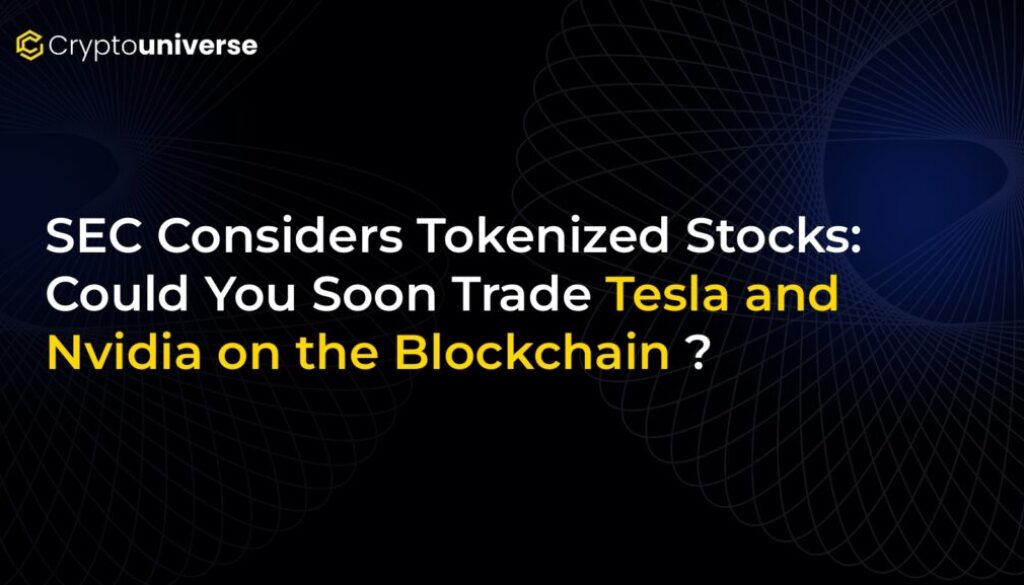SEC Considers Tokenized Stocks: Could You Soon Trade Tesla and Nvidia on the Blockchain?

The Future of Wall Street Might Be on the Blockchain
Imagine a world where you can trade shares of your favorite companies like Tesla and Nvidia with the same ease and speed as trading Bitcoin—24 hours a day, 7 days a week. According to recent reports, the U.S. Securities and Exchange Commission (SEC) is actively exploring a framework that could make this a reality, potentially paving the way for traditional stocks to be traded as digital tokens on blockchain networks.
This groundbreaking initiative could fundamentally reshape the architecture of financial markets, merging the established world of equities with the cutting-edge technology of cryptocurrency. But as with any major disruption, it has drawn clear lines in the sand between fintech innovators eager for change and financial incumbents determined to protect the status quo.
What Exactly Are Tokenized Stocks?
Before diving into the regulatory battle, let’s break down the core concept. A tokenized stock is a digital token that represents ownership of a share in a publicly traded company. Think of it as a digital wrapper for a traditional stock, with its ownership and transfer recorded on an immutable blockchain ledger.
This approach offers several potential benefits over the current system:
- 24/7 Markets: Unlike the 9:30 a.m. to 4 p.m. trading window of Wall Street, blockchain-based markets never close.
- Fractional Ownership: Tokenization makes it easier to divide shares into smaller, more affordable fractions, opening up investment opportunities for a wider audience.
- Increased Efficiency: By using blockchain for settlement, trades could be finalized in minutes instead of the current standard of two business days (T+2), reducing counterparty risk and costs.
- Greater Transparency: All transactions are recorded on a public ledger, offering a new level of transparency into market activity.
The SEC’s Plan and the Industry Divide
According to a report by The Information, SEC staff are already in discussion with key market players to build a regulatory framework for this new trading model. This move, which has roots in a crypto-focused agenda from the previous administration, signals a significant step by the regulator to embrace financial innovation.
On one side, crypto-native companies and modern brokerage platforms like Coinbase and Robinhood are reportedly lobbying for swift approval. For them, offering tokenized stocks is a natural evolution, allowing them to bridge the gap between their crypto-savvy user base and the multi-trillion-dollar equity market.
On the other side, however, are the titans of traditional finance. Large banks and established brokers are pushing back against the proposal. Their opposition is understandable; the current infrastructure for trading, clearing, and settling stocks is a massive source of revenue for them. A shift to a decentralized, blockchain-based model threatens to disintermediate these players and disrupt their long-standing business models.
A Two-Pronged Approach: Innovation and Enforcement
While the SEC explores this futuristic trading system, it continues to police the intersection of crypto and traditional markets with a firm hand. A recent case involving QMMM Holdings Ltd. serves as a stark reminder of the agency’s focus on investor protection.
The SEC temporarily suspended trading in QMMM after its stock price exploded by nearly 1,000% in less than three weeks. The regulator cited potential market manipulation driven by social media promotions from “unknown persons.” The surge followed QMMM’s announcement of a “strategic entry into the cryptocurrency sector,” complete with a planned $100 million crypto treasury of Bitcoin, Ethereum, and Solana.
This action demonstrates the SEC’s dual strategy: while it is open to legitimate, well-regulated innovation like the tokenized stock framework, it will not hesitate to clamp down on the hype-fueled speculation and potential manipulation that can arise when crypto-style excitement bleeds into equity markets.
What Does This Mean for the Average Investor?
The SEC’s exploration of tokenized stocks is more than just a technical discussion; it’s a glimpse into the future of investing. If this framework is approved, it could democratize access to wealth creation by making it cheaper and easier for people around the world to invest in U.S. companies.
However, significant hurdles remain. Regulators will need to address complex issues around custody, security, and market stability. While the path forward is uncertain, the conversation itself is a monumental step. The potential for you to one day trade


